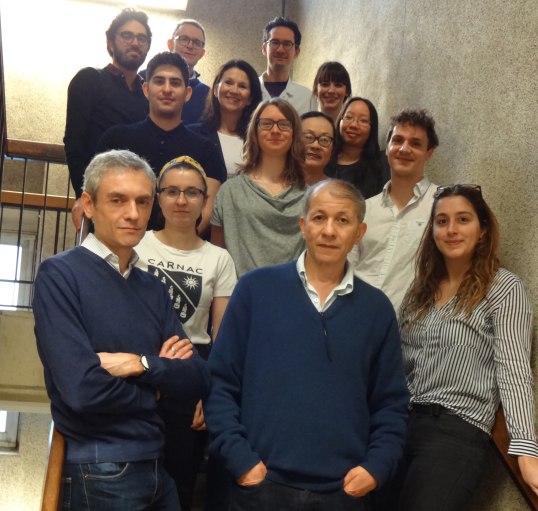Pathophysiology of glomerular diseases
Research topic
Our work is devoted to the study of human glomerular diseases, the leading causes of renal failure in the world, with two main axes around idiopathic nephrotic syndrome (axis 1) and nephro-oncology (axis 2).
In the first axis, the team studies the immunopathological mechanisms of glomerulopathies. Its work has made it possible to identify certain candidate genes for which animal models have been developed or are in progress. Current work aims to functionally characterize some of these models.
The team is also exploring the immuno-pathogenic link between environmental stress (infection, pollution) and flare-ups and relapses of idiopathic nephrotic syndrome.
The team’s second line of research aims to understand the pathogenic mechanisms underlying glomerulopathies induced by oncology therapies (chemotherapy or targeted biological treatments), at the cellular and molecular level. Indeed, this work involves the study of cell signalling pathways, as well as the study of communication between the different cell types of the glomerulus (podocytes, parietal epithelial cells, endothelial cells).
The team is developing innovative therapeutic approaches based on the treatment of experimental podocytopathies by nano-interference .
The team benefits from the coordination of the National Reference Centre for Idiopathic Nephrotic Syndrome and access to its cohorts and biobanks.
Research axes
-Kidney Immunopathology
-Nephro-oncology
-New therapeutic approaches by nano-interference
Key Figures
9 Teacher-researchers and university hospitals
1 Researcher
4 Hospital staff
1 Post-doc
3 PhD students
2 Administrative and technical staff
Keywords
glomerulopathies, nephro-oncology, signalling, nano-interference
Selected publications
Savas B, Fofana F, Le Gouvello S, Pawlak A, Sahali D*, Ollero M. Immunopathogenesis of idiopathic nephrotic syndrome.
Cell Mol Immunology, 2022 doi: 10.1038/s41423-022-00908-8. Online ahead of print (* corresponding author)Colucci M, Oniszczuk J, Vivarelli M, Audard V. 3. B-Cell Dysregulation in Idiopathic Nephrotic Syndrome: What We Know and What We Need to Discover.
Front Immunol. 2022 Jan 24;13:823204. doi: 10.3389/fimmu.2022.823204. eCollection 2022.PMID: 35140723Oniszczuk J, Le Floch F, Mansour O, Alimi M, LeCœur C, Audard V, Sahali D, Carbonnier B, Pawlak A, Belbekhouche S. Kidney–Targeted drug delivery systems based on tailor-made nanocapsules.
Chem Eng J, 2021, 404(6):126475-96Zhang SY, Fan Q, Moktefi A, Ory V, Audard V, Pawlak A, Ollero M, Sahali D, Henique C. 2. CMIP interacts with WT1 and targets it on the proteasome degradation pathway.
Clin Transl Med. 2021 Jul;11(7):e460. doi: 10.1002/ctm2.460.PMID: 34323419Oniszczuk J, Sendeyo K, Chhuon C, Savas B, Cogné E, Vachin P, Henique C, Chiara Guerrera I, Astarita G, Frontera V, Pawlak A, Audard V, Sahali D and Ollero M. CMIP is a negative regulator of T cell signaling.
Cellular & Molecular Immunology, 2019; 10.1038/s41423-019-0266-5Lazareth H, Henique C, Lenoir O, Puelles VG, Flamant M, Bollée G, Fligny C, Camus M, Guyonnet L, Millien C, Gaillard F, Chipont A, Robin B, Fabrega S, Dhaun N, Camerer E, Kretz O, Grahammer F, Braun F, Huber TB, Nochy D, Mandet C, Bruneval P, Mesnard L, Thervet E, Karras A, Le Naour F, Rubinstein E, Boucheix C, Alexandrou A, Moeller MJ, Bouzigues C, Tharaux PL. The tetraspanin CD9 controls migration and proliferation of parietal epithelial cells and glomerular disease progression
Nat commun 10:3303, 2019P Rémy, V Audard, P.A. Natella, G Pelle, B Dussol, H. Leray-Moragues, C.Vigneau, K. Bouachi, J. Dantal, L. Vrigneaud, A. Karras, F. Pourcine, P. Gatault, P. Grimbert, N. Ait Sahlia, E. Daugas, C. Combe, S. Bastuji-Garin and D. Sahali. Low dose steroid plus enteric-coated mycophenolate sodium versus high dose of steroid therapy for the treatment of Minimal Change Nephrotic Syndrome in adults (MSN Study): a French multicenter randomized controlled clinical trial (on behalf of the MSN trial investigators.).
Kidney Int. 9: 1217-1226, 2018Vachin P, Boumediene A, Sendeyo K, Oniszczuk J, Zhang SY, Henique C, Pawlak A, Audard V, Ollero M, Guigonis V, Sahali D. NEPHRUTIX: A randomized, double-blind, placebo vs Rituximab-controlled trial assessing T-cell subset changes in Minimal Change Nephrotic Syndrome.
J Autoimmun. 2017 Oct 19. pii: S0896-8411(17)30583-8. doi: 10.1016/j.jaut.2017.10.006.C Hénique, G Bollée, X Loyer, F Grahammer, N Dhaun, M Camus, J Vernerey, F Gaillard, L Guyonnet, H Lazareth, C Meyer, I Bensaada, L Legrès, T Satoh, S Akira, P Bruneval, S Dimmeler, A Tedgui, A Karras, E Thervet, D Nochy, T Huber, L Mesnard, O Lenoir, and PL Tharaux*. Genetic and Pharmacological Inhibition of MicroRNA-92a Maintains Podocyte Cell Cycle Quiescence and Limits Crescentic Glomerulonephritis
Nat commun 8:1829, 2017Moktefi, A., Zhang, S.Y., Vachin, P., Ory, V., Henique, C., Audard, V., Rucker-Martin, C., Gouadon, E., Eccles, M., Schedl, A., Heidet L, Ollero M, Sahali D, Pawlak A. 2016. Repression of CMIP transcription by WT1 is relevant to podocyte health.
Kidney Int. 90:1298-1311, 2016Mangier M, Izzedine H, Ory V, Zhang SY, Sendeyo K, Bouachi K, Audard V, Péchoux C, Soria JC, Massard C, Bahleda R, Bourry E, Khayat D, Baumelou A, Lang P, Ollero M, Pawlak A, Sahali D. Expression patterns of RelA and CMIP are associated with different glomerular diseases following anti-VEGF therapy.
Kidney Int 85:457-70, 2014Sahali D, Sendeyo K, Mangier M, Audard V, Zhang SY, Lang P, Ollero M, Pawlak A. Immunopathogenesis of idiopathic nephrotic syndrome with relapse.
Semin Immunopathol 36:421-9, 2014.